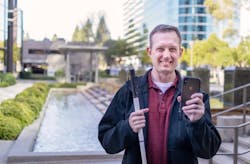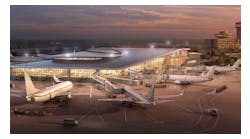Tulsa International Airport Provides Passengers with Access to Visual Interpreting Services App Aira
Tulsa International Airport (TUL) passengers who are blind or have low vision (BLV) now have free access to the Aira app, which is a visual interpreting service that acts as an assistant to help users navigate their environments and answer their questions. Aira customers are able to use this service anywhere for a fee, but users won’t have to pay while in the terminal.
Several other airports also partner with Aira including, Dallas Love Field Airport (DAL), St. Louis Lambert International Airport (STL), Los Angeles International Airport (LAX), Charlotte Douglas International Airport (CLT), Orlando International Airport (MCO), Phoenix Sky Harbor International Airport (PHX) and Port Authority of NY & NJ (LGA, JFK, EWR). In addition to these airports, Aira has similar affiliations with Tulsa Transit, and every Target, Starbucks and Bank of America location. Visit their site to see a full list of Aira Access Partners.
"Partnering with Tulsa International Airport to offer Aira services is a testament to their commitment to enhancing accessibility and inclusivity,” said Troy Otillio, CEO of Aira. “Together, we’re breaking barriers and empowering travelers who may be blind or have low vision to navigate and experience the airport with independence."
“Improving access to air travel is a passion of ours, and we believe this service will make flying easier for passengers who are blind or have low vision,” said Bryan Crook, Director of Customer Experience at Tulsa International Airport. “We are grateful to be working with Aira since they are the experts in this space.”
The American Foundation for the Blind (AFB) has the most up-to-date census data on the BLV community. For Oklahomans between the ages of 18-74, there are roughly 93,000 individuals with some form of low vision or blindness. According to data provided by airlines that operate out of Tulsa International Airport, there were over 500 people in 2022 who reported that they are blind or have low vision and requested assistance at TUL.



